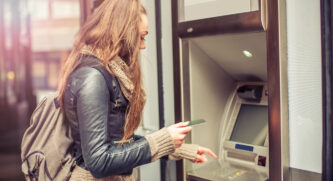
How safe is your bank information?
May 20, 2015From applications on mobile devices to the ability to “go green” with online bill pay, technology has provided customers with numerous opportunities and efficient processes to conveniently do their personal banking. However, these opportunities have also provided internet criminals with a similar opportunity.
When it comes to your online banking, how are you protecting yourself? A couple of proactive measures can be found below to help customers safely bank online and with mobile devices.
- Create a strong password for your bank account. Passwords are an important component to protecting your financial information. Creating a strong password may include 8 or more characters with a variety of upper and lowercase letters, numbers, and symbols. NEVER use part of your Social Security number or other personal or sensitive information as a password or portion of a password. If using personal financial information in a password such as a credit card or PIN number, you are exposing your account to vulnerability. Gained access to this information allows for greater ease in a hacker accessing your account.Varying log-in names and passwords for each account is highly recommended. By providing a variety of log-in credentials, your accounts will become more difficult to track and access. While many recommend not writing down your log-in information, we recognize the difficulty in remembering all the various combinations. It may be wise to invest your time and resources into a password manager, which will assist in helping you to maintain your privacy and remain financially protected. If interested in a password manager, do your research. Placing trust in an application used to store your financial credentials is not a task to take lightly. To read up on some options for password managers, look here.
- Keep sensitive personal information, bank account numbers, and passwords off your phone. In our day and age, quickness and efficiency are at the top of our lists. Cookies are a mechanism used by your computer or mobile device to store personal information on websites, and may seem like an answered prayer. From storing log-in credentials to credit cards information, cookies allow for an all-around quicker process in many ways. Unfortunately, cookies do not come without costs. Storing passwords to your bank account and saving your credit card on certain sites increases your likelihood to be targeted by hackers. Cookies will not carry viruses or accrue hackers, but by storing this information on your computer, your account privacy and safety may be compromised. We advise to always log out of your bank account when closing the browser. Failing to log out may expose your account for session hijacking and exploitation. In addition, clearing your cookies and browser cache will allow for a safer browsing experience. To learn more, check out this article from some cache clearing experts.
- Avoid opening other applications or emails while banking online. Many people have the false impression that banking online in the privacy of their own home is a safe environment for banking. While this is partially true, many do not realize opening emails and other browser windows may compromise the privacy and security of convenient online banking. Eliminating the use of other applications will decrease the ability of internet criminals to gain access to your bank account. Our best advice is to avoid multitasking while doing banking online.
- Don’t respond to emails (or automated calls) that claim to be from your bank requesting your account details. A Plains Commerce Bank customer recently received an automated call stating the individual’s card was blocked. The customer was then asked to enter the card number, expiration code and CVV code to reactivate the card. As your trusted lender, we promise to protect you and your finances. Therefore, we will never approach you in this manner to receive personal account or card information. If you receive a suspicious call or email, call your bank to confirm the issue before taking action to interact with hackers. Be sure to use the telephone number on your last bank statement, not the number provided by the voicemail or email to ensure your protection and privacy.
If you have been hacked in the past, it is important to understand why. Complete a thorough audit of your current situation. Look for vulnerabilities using the list above and adjust accordingly to protect your online or mobile finances from potential threats. Above all, take precautionary measures to ensure your account does not receive further threats from online hackers.
Online security is important, and it is our goal to provide you with a safe banking experience. It is our hope that our customers will never undergo a financial security hack; however, it is important to be prepared. If you have any additional questions about protecting your account, please call us. We’re more than willing to stand by you and safeguard your assets.
Sources:
http://www.androidauthority.com/hacks-security-breaches-2014-577255/
http://netsecurity.about.com/od/security101/a/Online-Banking-Security-Tips.htm
https://www.bankofamerica.com/deposits/manage/online-security-tips.go
https://www.bankofamerica.com/privacy/online-mobile-banking-privacy/online-banking-security.go
http://www.allaboutcookies.org/privacy-concerns/
http://www.guidingtech.com/8925/what-are-browser-cache-cookies-does-clearing-them-help/
http://www.oxforddictionaries.com/us/definition/american_english/security-patch?q=security+patch
http://www.cnet.com/news/best-password-managers/
http://www.reporter.bz/features/how-to-respond-to-a-hacker-attack/
http://www.statisticbrain.com/online-mobile-banking-statistics/
http://www.cnet.com/news/best-password-managers/
